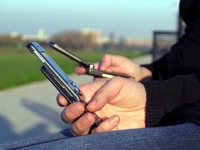BYOD: Like inviting your boss into your house when you're not home


On the surface, being able to use your beloved smartphone for both personal and work activities sounds like a good idea. For many, not having to use two different phones is reward enough, and others find it a blessing not having to use a work phone running a platform they don't like. As compelling as BYOD may be, it's not without exposure.
When you have a phone assigned by your employer you know it's for work and nothing else. You've been warned not to make personal calls, use the phone for personal email, etc. You don't play around with the work phone, that's restricted to your personal phone.
Don't miss the special feature: BYOD and the Consumerization of IT
Once you bring your personal phone to work as part of a BYOD program, all of that changes even though it may not be obvious. It may seem like it's your own phone, and technically it is, but with the employer involved that's not quite true.
The only way to protect yourself is don't keep any personal stuff on your BYOD phone. That may defeat the purpose of using your own phone for work but that's the harsh reality.
Your BYOD phone may be set up by your employer to have your personal stuff separate from your work stuff which is good. You should be able to take photos, install and use apps, along with other activities you'd do on your phone without BYOD participation.
What you must realize is that your employer may insist at some point to scrutinize what's on your BYOD phone. Perhaps there's a rumor that an employee is grabbing company information, or that someone is snapping photos of sensitive things in the office. Maybe your company simply wants to update your work apps or settings.
Whatever the reason, it's not outside the realm of possibility that one day your employer may analyze the information on your phone. Yes, it's your personal phone but the BYOD situation means it's also the same as a work-provided phone.
Maybe it's not a big deal if your boss asks you to hand your phone over, but it still won't be a comfortable situation. What personal photos have you taken that reside on the phone? What intimate text messages have you exchanged with your spouse? You get the picture. It would be sort of like inviting your boss to your home when you're not there. What might he find snooping around your hacienda?
Featured
It's not just phones, either. Some folks are taking tablets to work and those may expose even more personal data. Tablet owners usually surf the web more heavily on a tablet than a phone. What would your boss see if your web history was analyzed?
The only way to protect yourself is don't keep any personal stuff on your BYOD phone. That may defeat the purpose of using your own phone for work but that's the harsh reality. Don't keep any photos on the phone. Don't keep any communications of any kind that you don't want your employer to see. The rules change when you use your own phone for work.
The fact is even innocuous things on your phone could get you in a world of trouble if your employer saw them. That photo you took of your buddies after a few too many in the local pub? That could get them in hot water if they are coworkers and your/their boss saw it. Same for that email your coworker sent to your personal email with complaints about his/her boss.
It's important to realize that even though you own the phone and you keep the non-work stuff separate from the work activities, that information is still exposed to the employer upon demand. If the company IT people need to see your phone, it's out of your hands (literally) and there's nothing you can do about. At that point it's only sort of your phone.
See related:
BYOD: Death of the nonworking vacation?